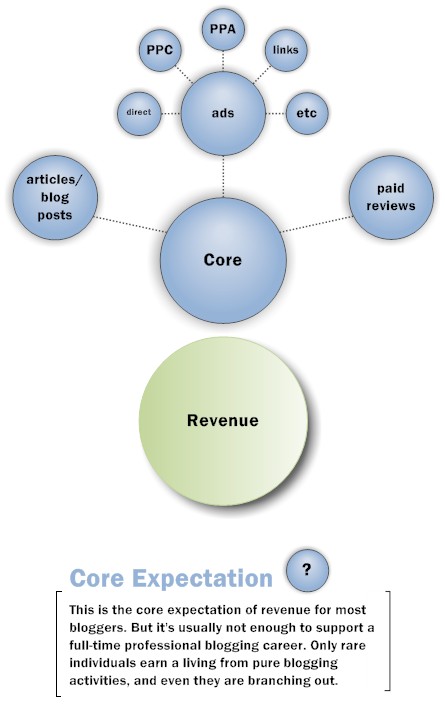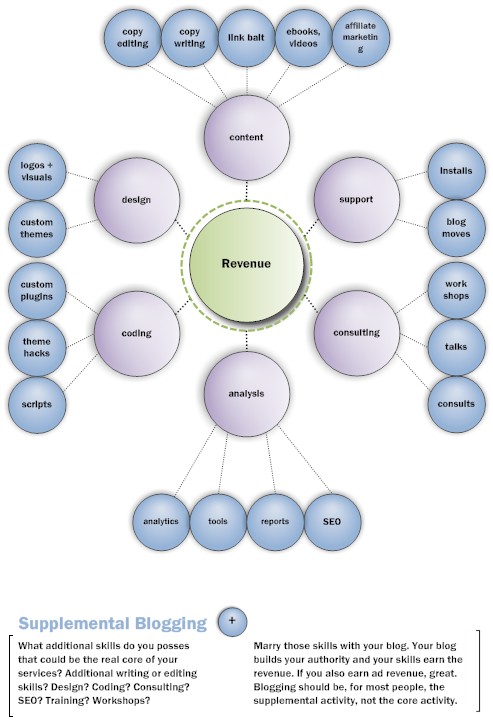 After browse-reading Yaro Starak’s very informative and very free 55-page ebook Blog Profits Blueprint, the thought came to me that maybe most of us bloggers should not be expecting to experience blogging as a full-time career. Have I lost my mind? Well, I haven’t kept it a secret from people that know me that other aspects of online work have been beckoning to me lately. And despite my love of blogging, I’ve been looking into these alternatives to pad out my online activities. Maybe you should, too. Why? Well, consider the diagram labelled “Core Expectation”.
After browse-reading Yaro Starak’s very informative and very free 55-page ebook Blog Profits Blueprint, the thought came to me that maybe most of us bloggers should not be expecting to experience blogging as a full-time career. Have I lost my mind? Well, I haven’t kept it a secret from people that know me that other aspects of online work have been beckoning to me lately. And despite my love of blogging, I’ve been looking into these alternatives to pad out my online activities. Maybe you should, too. Why? Well, consider the diagram labelled “Core Expectation”.
The diagram shows some of the revenue streams that the average new blogger can expect. There really isn’t much, is there? How hard do you have to work to get to the point where you can earn at least a part-time living, if not a full-time living? Yaro mentions that he now works maybe a few hours a day writing at most one post per day. Nice. He also admits it took him more than two years to get there.
Now while you have the advantage of Yaro’s advice in the ebook, not to mention all the great blogs about blogging, you still have to establish yourself, get yourself to the point where you have enough traffic to support a reasonable income. Even with all the advice you can find, it’s still going to take the average blogger a year or longer. Some will never get there. Unless you go the for-hire route that I have.
I enjoy it. I’ve been a contractor/ freelancer for a very long time and I know the highs and lows and ups and downs. But many of you probably want to work for yourself. What if we’re all looking at this blogging thing wrong? Maybe we should not expect blogging to produce the core revenue streams. Maybe there’s another way that still involves blogging.
 So how could most of us earn a living online while involving blogging but not relying on “blogging” income? For an answer, have a look at the diagram labelled “Supplemental Blogging” [click to enlarge].
So how could most of us earn a living online while involving blogging but not relying on “blogging” income? For an answer, have a look at the diagram labelled “Supplemental Blogging” [click to enlarge].
Each activity listed in this diagram is a verifiable online service. That is, someone somewhere on the Internet is charging for each.
So what if you shifted your whole mindset towards being service-oriented, a digital entrepreneur? Offer those services that you are skilled at, and as time allows, add to your skills.
Now, blogging serves as a supplement to your activities. It builds up your authority and reputation, and serves to sell your services. You are no longer relying on measly blog income in the early stages of your online career. You can still have a blog with advertising, but because you are selling services, you might be a bit more cautious about what ads you slap on your blog.
If you think about it, I’m not really saying anything new, just suggesting a mindshift. Darren Rowse and others have written about income earned because of blogging, not from blogs themselves. All I’m saying is that maybe more of us need to consider this option.
[Note: Diagrams inspired by David Armano’s Experience Map.]
6 thoughts on “Rethinking Blogging as a Career”
…that will enhance you’ll supplemental income…professional, concise, and thorough (and the graphs, people with lots of money to pay consulting fees love graphs with circles that relate to each other
I also like your blog theme. Simple setup and easy reading.
Cheers. Thanks again for the article,
Richard
Thanks, Will. Good luck in your efforts
Interesting post and site. You have a lot of content here I will have to read. I came to blogging from a completely different perspective than most. I love to write and have written for many other sites and people. Often I never even kept track of where the things I wrote ended up. Sometimes I did not even keep copies of the stuff long term. Now that I started my own blog, I’ll have to be more professional about it.
Your balloon diagrams opened my eyes to a couple of ways to maybe get a little income for things I have, for years, done for free.
Thanks!
There’s lots of analogies that come to mind and in some situations they all apply. I’m planting different seeds for different businesses, growing out new channels, networking with new clients and partners, and sometimes I’m doing research and development or just throwing darts to see what sticks.
->
Great advice, Brett. Yeah, I left out some revenue streams, either on purpose for some and memory loss on the others I was hoping someone would point them out. Thanks!!
Good point on thee exit strategy. I’ve never done that until very recently, in the limited edition sites I’m working on.
Sounds like you are doing exactly what I’m suggesting: mixing blogging with other services and products.
I started as a consultant and moved into blogging for several reasons.
From my perspective, I see your diagram as a very natural thing. I’m not soley in this to blog. I enjoy writing a great deal. But I also love problem solving, design, consulting, and much much more.
I look at the entire thing as several different lines of business that can work together and like any good line of business, can work separately from time to time.
There are a couple items missing form the above diagram, (No diagram can ever be entirely complete). However, podcasting and audiobooks can be quite lucrative for people that do them well and have good voices.
The other one (and its much much more common) is the development of web real estate. There are a lot of people out there that are taking in a decent income from flipping websites and developing raw domains even.
Raj, you have more experience in this last area than I do or probably ever will, but I would suggest that some of that hard work put into a blog only pays off when someone finally flips the blog/domain/website.
Every good business needs a solid exist strategy. It should be part of the equation when you set the business up. You may start the blog or site with every intention of blogging forever, or at least leaving the website up long after you are deceased. However, from a business perspective you should make contingency plans for exiting your blog business or lines of business, just in case.
Comments are closed.